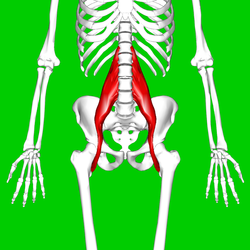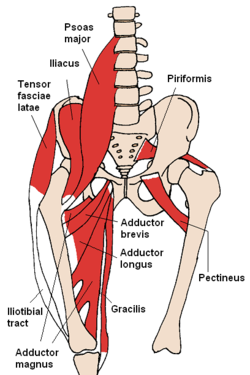Psoas muscle
| Psoas major muscle | |
|---|---|

Position of psoas major (shown in red)
|
|

The psoas major and nearby muscles
|
|
| Details | |
| Origin | Transverse processes of T12-L5 and the lateral aspects of the discs between them |
| Insertion | In the lesser trochanter of the femur |
| Artery | lumbar branch of iliolumbar artery |
| Nerve | Lumbar plexus via anterior branches of L1-L3 nerves |
| Actions | Flexion in the hip joint |
| Antagonist | Gluteus maximus |
| Identifiers | |
| Latin | Musculus psoas major |
| MeSH | A02.633.567.825 |
| Dorlands /Elsevier |
m_22/12550274 |
| TA | A04.7.02.004 |
| FMA | 18060 |
|
Anatomical terms of muscle
[]
|
|
The psoas major (/ˈsoʊ.əs/ or /ˈsoʊ.æs/) (from Greek: ψόας - psóās : 'of the loins', genitive singular form of ψόα - psóa 'the loins') is a long muscle located on the side of the lumbar region of the vertebral column and brim of the lesser pelvis. It joins the iliacus muscle to form the iliopsoas.
The psoas major is divided into a superficial and deep part. The deep part originates from the transverse processes of lumbar vertebrae I-V. The superficial part originates from the lateral surfaces of the last thoracic vertebra, lumbar vertebrae I-IV, and from neighboring intervertebral discs. The lumbar plexus lies between the two layers.
The iliacus and psoas major form the iliopsoas, which is surrounded by the iliac fascia. The iliopsoas runs across the iliopubic eminence through the muscular lacuna to its insertion on the lesser trochanter of the femur. The iliopectineal bursa separates the tendon of the iliopsoas muscle from the external surface of the hip joint capsule at the level of the iliopubic eminence. The iliac subtendinous bursa lies between the lesser trochanter and the attachment of the iliopsoas.
...
Wikipedia
